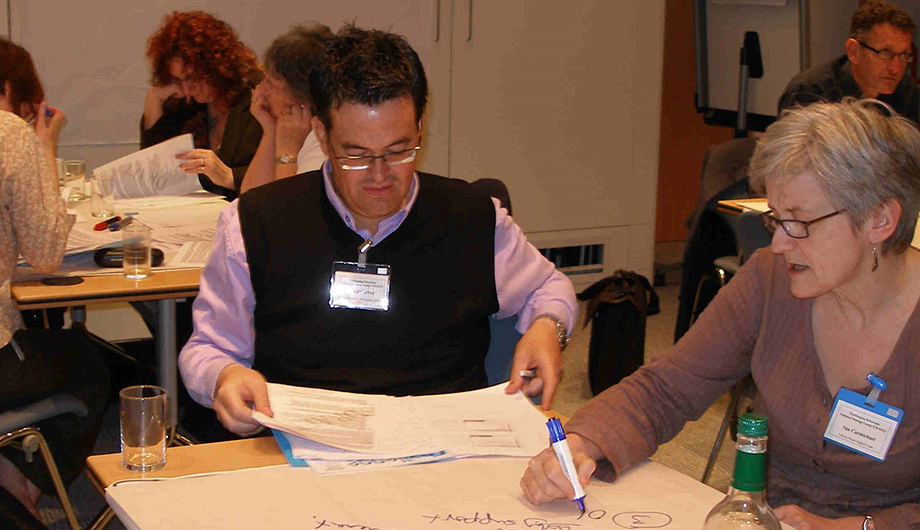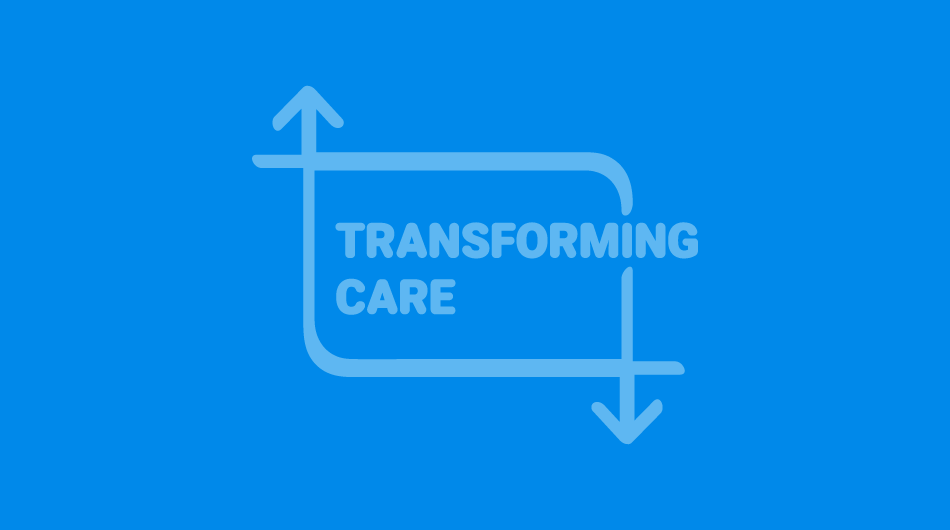
News
The CBF writes topical articles regularly and produces three newsletters a year, providing opinion and resources for families and professionals.

The CBF aims to improve lives for individuals with severe learning disabilities who display behaviour that challenges through our project work, using new approaches and encouraging others to learn from this work and improve their practices.
The National Institute for Health Research’s guidance on co-producing a research project emphasises the importance of researchers and those affected by research working together and sharing power and responsibility from the start to the end of the project. The CBF has a wealth of experience supporting co-production of research with family carers of individuals who have severe learning disabilities and behaviours that challenge.
If you are interested in finding out more about how The CBF can support you to involve family carers in your research, click on the button below.
Involving family carers in research
We’ve undertaken a large number of projects and research studies with the aim of improving lives for individuals with severe learning disabilities whose behaviour challenges.
We’ve grouped our projects into:
Click on the links below to find out more about our project and research work, both past and present.
Click on the arrows below to read a summary of each current project and piece of research The CBF are involved in, and click on the titles to view further information. If you can’t find what you are looking for, contact info@thecbf.org.uk.
Read about our projects and research work relating to support and services.
The CBF has been awarded National Lottery Funding for 3 years (commenced April 2024) to build on previous learning in the Getting It Right project (2019 – 2022). The Forward Together project is developing regional networks in three areas of England (Southeast, Midlands and Northwest) and facilitating regional multi-stakeholder Communities of Practice across these areas to improve and shape support and services for individuals with severe learning disabilities and behaviours that challenge, and their families.
'What Matters to Me’ is a 3-year project being carried out by The CBF and supported by the Tizard Centre at the University of Kent. The project, funded by the Blagrave Trust and Children in Need, involves recruiting a panel of young people aged 16-25 years who have severe or profound and multiple learning disabilities across various project partner settings and working with some young people individually. We will develop creative engagement methods to gather their experiences, preferences, and views in the context of relevant policy areas. The findings of the project will be used to create a multi-media manifesto to influence and drive change in policy making.
The CECILIA research study aims to understand the effectiveness of Care (Education) and Treatment Reviews (C(E)TRs) for adults with a learning disability and/or autistic people. Once the effectiveness of C(E)TRs is understood, the research will focus on outlining how to improve how C(E)TRs work, and the conditions that are required to support their effective implementation.
Families The CBF support have raised concerns about what will happen to their relative’s support in the event that they are no longer able to coordinate it. We have been working with family carers to learn about what support would be useful and based on this, are working to produce a practical template to support planning for the future.
As part of the Getting it Right project, The CBF are working with Paradigm to bring together support workers and families to identify what needs to be in place to facilitate collaborative working. This has involved holding focus groups with family carers and support workers to develop a resource that can be used to build strong positive relationships and overcome challenges.
The Mapping and Evaluating Services for Children with Learning Disabilities and Behaviours that Challenge (MELD) study is being run by the University of Warwick and aims to map English community-based services for children with learning disabilities and behaviours that challenge, describe these service models, and evaluate the outcomes and costs for using these services.
The CBF is involved in a research study, led by Professor Glynis Murphy from the Tizard Centre, on interventions for people with intellectual disabilities who demonstrate harmful sexual behaviour. The study aims to establish the clinical and cost-effectiveness of psychological treatment programmes.
This research involves interviewing people who have moved out of hospital, what has worked, what helped and what is difficult. The CBF is on the advisory group for this research study. The research team interviewed 11 people with learning disabilities about their experiences of moving out of hospital and used what they were told to develop a ‘moving process’ model. The research team’s aim now is to research what helps people with learning disabilities to stay living in the community long-term after leaving hospital.
This study aims to improve understanding and support for adults with learning disabilities who display moderate to severe aggression in community settings. Funded by the National Institute of Health Research, the research involves developing a personalised multicomponent approach which could be implemented by the NHS.
The External Support Group (ESG) was set up The CBF with the aim to improve the quality of life and care provision for individuals inappropriately stuck in hospital placements, by supporting them to be discharged with the right community support as well as influencing systematic change and improve practice in the long term. The ESG includes family carers, policy makers, researchers, commissioners, and clinicians with experiencing in supporting individuals with complex needs in community settings.
Read about out projects and research relating to changing poor practice.
The STOMP (Stopping Over-Medication of People with a Learning Disability, Autism or Both) and STAMP (Supporting Treatment and Appropriate Medication in Paediatrics) programmes are initiatives within NHSE to try to address the issues around inappropriate medication of people with learning disabilities and/or autism. The CBF has been raising the issue of over-mediation and inappropriate medication use for many years, with a succession of Government Ministers to highlight the issues and drive change.
This research aims to investigate the effectiveness of treating post-traumatic stress disorder (PTSD) for individuals with learning disabilities by using ‘Eye movement desensitisation and reprogramming’ (EMDR). EMDR treatments have been effective at treating PTSD in general populations, and this research will see whether adapted versions are similarly effective (and cost-effective) for individuals with learning disabilities.
The CBF is committed to reducing restrictive interventions. Reducing the use of restrictive practices has been a core focus for several of The CBF projects. The CBF has been working to bring to light families’ shocking experiences of restrictive interventions, including within schools. Working with families, we’re bringing key organisations together to develop a strategy which will tackle this issue across the UK. Our aim is to reduce restrictive interventions and safeguard children.
Read about our projects and research relating to early years and early intervention.
Early Positive Approaches to Support (E-PAtS) is an 8-session group programme for families delivered by a family and a professional working together. This randomised control trial aims to test whether E-PAtS improves wellbeing for parents who have a young child with additional developmental needs. It builds on an E-PAtS feasibility trial that ran from 2017-2019.
Read about our projects and research relating to data and evidence.
The READ project aims to improve the availability and accessibility of academic research publications for family carers. READ is a co-produced project led by The CBF and Sharland Foundation Developmental Disabilities Applied Behaviour Research and Impact Network (SF-DDARIN) and family carers.
Read about our projects and research relating to rights and advocacy.
Here is more information about some projects and research that The CBF has been involved in, that has now come to an end. Click on the arrows below to read a summary of each current project and piece of research, and click on the titles to view further information.
We’ve grouped our projects into:
Read about our projects and research relating to support and services.
The Insider Voices Project aimed to work with family carers who have lived experience of inpatient care to produce a resource on the culture of inpatient services and what can be done if frontline staff have concerns. The CBF co-produced a film to raise awareness of the culture of services which was launched in August 2024.
The Challenging Behaviour Foundation was commissioned by Skills for Care in 2023 to carry out work looking at the social care workforce in the Nottinghamshire area. The focus was to hear from families about what the workforce that supports them and their relatives should be like, particularly what level of skills and experiences support staff should have. This included frontline staff such as Personal Assistants (PA's) and support workers; in addition, the roles of leaders and social workers or commissioners of services.
The Video Interaction Guidance (VIG-LD) study was a research project ran by University College London and Tavistock & Portman NHS Foundation Trust. It aimed to evaluate remotely delivered VIG with parents of children who have learning disabilities and whose behaviour challenges, who have been referred to learning disability CAMHS (Child and Adolescent Mental Health Services) or paediatric neurodevelopmental services.
The CBF are working with Black Country Transforming Care Partnership (TCP) to enable development of a peer support model as part of their Key Working for Children and Young People pilot. The aim of the pilot is to employ key workers from a range of backgrounds who will work as a team supporting each other to provide flexible and timely input to children and young people, families, and carers across the Black Country, dependent upon the demand identified through the Black Country dynamic risk register.
In 2020, The CBF worked with NHSE&I on a piece of work aiming to develop partnership working between learning disability nurses and families and held a workshop as a pilot bringing together families and learning disability nurses in a locality
The CBF was awarded National Lottery funding for 3 years (commencing 2nd September 2019) to help improve both national and local information and support for children and adults with severe learning disabilities and their families, and working with partners in 3 local areas (West Sussex, the Black Country, and Camden). This involves 3 interconnecting streams of work, building on previous work we have found to be effective: Strategic local input, Sharing information and best practice, and Strategic national work.
From 2017-2020, Professor Angela Hassiotis, UCL, led a study to evaluate the cost-effectiveness of intensive support teams for adults with intellectual disabilities whose behaviour can challenge. The study was funded by NIHR and the CBF supported four family carers to participate in the study as a reference group.
This research looked at where individuals who have transitioned from residential schools are placed. The research involved young people with learning disabilities who transitioned to adult services, family carers, commissioners, and residential school staff. The research aims to seek out why some young people with learning disabilities are placed in-or-out-of-area placement following transition from a residential school. This project was led by Professor Peter McGill.
The research aimed to improve the quality of support for adults with learning disabilities who display challenging behaviour by enhancing staff’s understanding of the perspective and experiences of those who have been labelled as challenging. Training was developed and was delivered by a trainer with a learning disability and a co-trainer who did not have a learning disability. The study evaluated the effectiveness of the training with 120 residential support services who were recruited to take part in the training. The project was led by Professor Richard Hastings
Read about our projects and research relating to changing poor practice.
The CBF have explored how individuals with learning disabilities, their families, support staff, and those working in the learning disability sector have experienced the challenges, benefits, and new methods of working which have arisen in response to the pandemic and lockdown. The CBF gathered information from a range of stakeholders about their experiences of the pandemic through a survey. The findings of the survey were considered alongside concurrent work undertaken by researchers from SF-DDARIN. Together, findings were discussed at the Challenging Behaviour National Strategy Group meeting in October 2020.
The CBF worked in collaboration with MindEd to produce online STOMP (STopping OverMedication of People with a learning disability and autistic people) modules. These 10 modules were developed in partnership with family carers recruited by the CBF.
Short-term Psycho-Education for Carers to Reduce Over Medication of people with intellectual disability (SPECTROM) is an NHS funded research project related to STOMP. The CBF has collaborated with other organisations and professionals to produce a psychoeducational programme for Care Staff and a website full of resources and other accessible materials that we hope are of use to the wider audience.
The CBF was a partner in a project with Respond, and the Tizard Centre funded by NHSE to look at the need for trauma support for the family carers of children and adults with learning disabilities and/or autism. In the first strand of the project, the CBF gathered the views of family carers and worked with Respond to provide advocacy support to some families in the second strand of work. The third strand of work was conducted by Respond and the Tizard Centre to gather the views of professionals. Together these three strands of work have been written up into a final report currently waiting for NHSE Sign-off. Some follow up work funded by NHSE involved the CBF, Respond and Tizard Centre working with families to co-produce a training resource for professionals about the trauma experienced by families through their interaction with “the system” trying to access support for their relatives.
Read about our projects and research relating to valuing individuals and their families.
The CBF and Tizard Centre, University of Kent led a research alliance with family carers of people with a learning or developmental disability and researchers who develop research skills. This alliance aimed to ensure that research and other related projects are meaningful, practical, and high quality. This is because despite family carers being in an invaluable position to provide insights into the needs and experiences of their relatives, they are often not included sufficiently, if at all, in relevant research. The group has been suspended due to a lack of capacity and funding.
This report by The Challenging Behaviour Foundation and Mencap gives examples of how organisations have actively sought and responded to the views of children with severe or profound and multiple learning disabilities in ways that other people can replicate. It tackles misconceptions, signposts further useful information and is aimed at anyone involved in supporting children or young people with learning disabilities including schools, CAMHS and short breaks.
Everybody Matters is the result of a 2015 film project starring Colleen and Shaun, both of whom have learning disabilities and display behaviour described as challenging. Shaun and Colleen have experienced poor support and had restricted, unhappy, and sometimes unsafe lives in the past. Their stories show that everyone can be supported to live a full and active life in their community.
Following the Winterbourne View abuse scandal, The CBF worked with other voluntary organisations for 4 years to promote involvement of Experts By Experience (ExE) within the work of the Care Quality Commission. We were the support organisation for ExEs who are family carers of adult relatives (aged 16 years old or above) with a learning disability who display behaviour described as challenging and/or mental health needs; or family carers of adult relatives (aged 16 years old or above) with profound and multiple learning disabilities. Family Carer ExEs produced a report about the Learning disability Review, and contributed to CQC’s 3 lives report.
Read about our projects and research relating to early intervention.
In partnership with the Tizard centre, The CBF worked with colleagues leading the Transforming Care programme in Cumbria to pilot an evidence-based early intervention approach in the county.
In 2018, an evidence seminar was held on children and young people with learning disabilities whose behaviours challenge to look at what we already know from research and data, understand the work that is currently ongoing and identify gaps, and prioritise recommendations going forward
E-PAtS is an 8-week programme for families raising a young child (five years and under) with a learning and/or developmental disability. It was developed by the Tizard Centre with family carers with input from other key stakeholder including The CBF.
This three-year project, delivered in partnership with the Council for Disabled Children aimed to facilitate improved early intervention across the country. The Paving the Way report summarises the findings.
Read about our projects and research relating to data and evidence.
The Care Quality Commission collects a lot of information about care homes. This one-year research study aims to find out how information collected by the CQC about these homes could be used to detect and prevent abuse of people with a learning disability and autistic people living in them, and to test whether a larger research project would be helpful. The CBF recruited and supported a family carer advisory group for the study, and the study is being written up in early 2024.
Read about our projects relating to rights and advocacy.
The CBF contributed to the NHSE Advocacy project which focused on reviewing advocacy for individuals with learning disabilities and/or autism in inpatient units. The CBF fed into the work by sharing input from family carers around their experiences of advocacy and family advocacy via a family carer survey, and a focus group. Other organisations (e.g., Bringing Us Together) were asked to look at the experiences of young people with disabilities, and advocacy organisations were asked to provide experiences of paid advocates.
The Medway Advocacy Project was a demonstration project exploring how effective advocacy can be offered to individuals with learning disabilities whose behaviour is described as challenging, as issues surrounding their support can be extremely complex. The Project provided advocates, partnered with family advocates, with specialist training and support to enable them to work effectively with these individuals.
The SHIEC project aimed to support genuine paid employment for people with learning disabilities who have additional complex needs. This included people with profound and multiple learning disabilities, those with severe learning disabilities whose behaviour challenges, and people with learning disabilities and histories of mental health problems or offending behaviour. SHIEC was a hub of individuals and organisations in the Southeast who are working together to achieve this.

The CBF writes topical articles regularly and produces three newsletters a year, providing opinion and resources for families and professionals.

The CBF operates an email network for professionals working in the field of challenging behaviour associated with severe learning disabilities.

This page askes the question 'What is Transforming Care?' It includes a summary of the history of Transforming Care, and details of how the CBF has been involved.